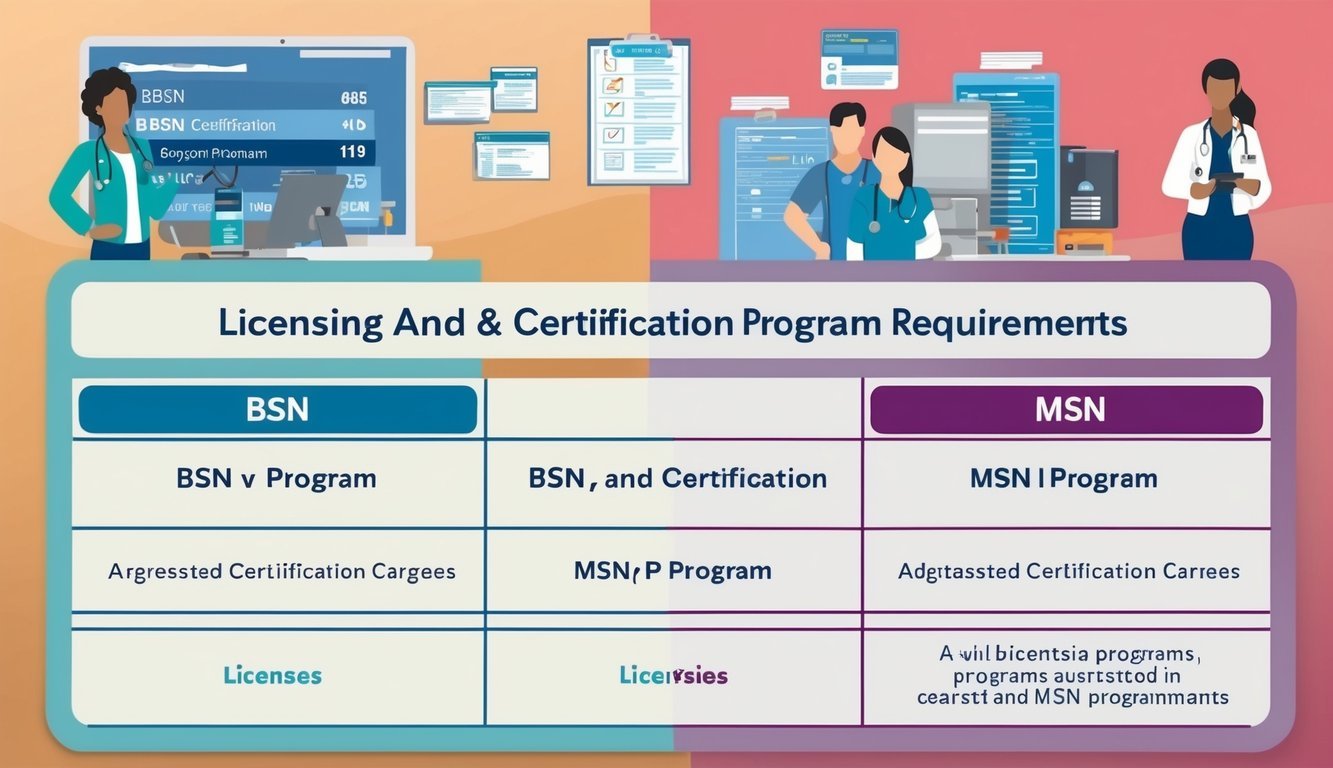Choosing between a Bachelor of Science in Nursing (BSN) and a Master of Science in Nursing (MSN) can significantly impact your career trajectory in the nursing field.
The BSN serves as the foundation for most nursing careers, while the MSN opens doors to advanced practice roles and leadership positions.
Understanding the differences between these nursing degrees is crucial for making an informed decision that aligns with your career goals.
A BSN program typically focuses on providing you with essential nursing skills, theory, and patient care, making it a requirement for many entry-level nursing positions.
In contrast, pursuing an MSN allows you to specialize in areas such as nurse practitioner, nurse educator, or nurse administrator, offering greater autonomy and responsibility in your practice.
Each path has distinct advantages, depending on whether you aim for a technical role or aspire to take on leadership and specialized roles in healthcare.
With the demand for skilled nurses at an all-time high, it is vital to evaluate your options carefully.
By exploring the distinctions between a BSN and an MSN, you can better prepare yourself for the challenges and opportunities that lie ahead in your nursing career.
Understanding these differences will empower you to choose the path that best fits your aspirations and goals in nursing.
Education and Curriculum Differences
When choosing between a Bachelor of Science in Nursing (BSN) and a Master of Science in Nursing (MSN), understanding the educational structure and curriculum is crucial.
Each program has distinct elements designed to equip you with the necessary skills and knowledge for your nursing career.
BSN Program Structure
A BSN program typically spans four years and includes both classroom instruction and clinical experience.
The curriculum focuses on foundational nursing principles, healthcare systems, and patient care.
Core Components:
- General Education Requirements: Courses in psychology, sociology, and biology.
- Nursing Coursework: Subjects such as adult health nursing, pediatrics, and community health.
- Clinical Rotations: Hands-on training in diverse healthcare settings.
This comprehensive program prepares you for entry-level nursing positions and sets the stage for future advanced education.
MSN Program Structure
An MSN program generally takes two years to complete for students who already hold a BSN.
The curriculum is more specialized, focusing on advanced practice and leadership roles in nursing.
Key Areas:
- Advanced Nursing Practice: Includes specialization in fields like nurse practitioner, nurse anesthesia, or nurse midwifery.
- Leadership and Policy: Explores healthcare policy, management, and ethical decision-making.
The MSN program emphasizes critical thinking and evidence-based practice, preparing you for high-level roles in healthcare settings.
Advanced Nursing Coursework
Advanced coursework is a hallmark of the MSN program.
It delves deeper into clinical practices and healthcare management.
Typical Courses:
- Pathophysiology and Pharmacology: Understanding disease processes and medication management.
- Research Methods in Nursing: This is essential for developing evidence-based practices.
- Leadership in Nursing: A focus on team management and healthcare improvement.
This advanced education not only enhances your clinical skills but also positions you for roles that require greater autonomy and responsibility.
Career Pathways and Specializations
The choice between a BSN and an MSN significantly influences your nursing career trajectory and specialization options.
Each degree opens unique opportunities, allowing you to tailor your career to your interests and goals within the nursing field.
Nursing Career Opportunities with a BSN
A Bachelor of Science in Nursing (BSN) prepares you for various roles in healthcare, primarily as a registered nurse (RN).
With a BSN, you can work in settings such as hospitals, clinics, and community health organizations.
Here are some common career options:
| Role | Description |
|---|---|
| Registered Nurse | Provides direct patient care. |
| Public Health Nurse | Focuses on community health. |
| Nurse Educator | Teaches nursing students. |
| Nurse Administrator | Manages nursing staff and operations. |
Obtaining a BSN can also enhance your employment prospects due to the increasing demand for nurses with higher education.
Furthermore, many employers offer better salary packages for BSN holders compared to their ADN counterparts.
Advancing to Nurse Practitioner and Beyond with an MSN
Pursuing a Master of Science in Nursing (MSN) allows you to advance your career as a nurse practitioner (NP) or in other advanced practice nursing roles.
With an MSN, you can specialize in areas such as family practice, pediatrics, or mental health.
Roles associated with an MSN include:
| Role | Description |
|---|---|
| Nurse Practitioner | Provides primary care and makes clinical decisions. |
| Clinical Nurse Specialist | Offers expert care in specific nursing fields. |
| Nurse Anesthetist | Administers anesthesia and manages patients during surgery. |
| Nurse Midwife | Focuses on prenatal, delivery, and postnatal care. |
An MSN opens doors to leadership roles, allowing you to take on responsibilities like nurse educator or chief nursing officer, where you can shape the future of nursing.
Nursing Specializations and Advanced Roles
With either a BSN or MSN, you can pursue various nursing specializations.
Advanced practice registered nurses (APRNs) lead in clinical settings, focusing on specific patient populations.
Some notable specializations include:
- Psychiatric Nurse Practitioner: Addresses mental health issues through diagnosis and therapy.
- Nurse Leader: Advocates for best practices and leads nursing teams.
- Director of Nursing: Oversees nursing operations and staff development.
Each specialization requires targeted education and training, allowing you to enhance your skills and provide exceptional care.
Pursuing these advanced roles not only improves patient outcomes but also contributes to your personal and professional growth in the nursing field.
Licensing and Certification Requirements

Understanding the necessary licensing and certification requirements is crucial for advancing your nursing career.
This section outlines the key steps you need to take based on your educational path and career goals.
NCLEX-RN Licensing
To become a registered nurse (RN), you must pass the NCLEX-RN exam.
This exam evaluates your competency in various nursing skills and knowledge areas.
Here’s a breakdown of the process:
- Eligibility: You must complete an accredited nursing program, such as a BSN or ADN.
- Application: Submit an application to your state’s nursing board, including proof of education.
- Exam Registration: Once approved, you can register for the NCLEX-RN through Pearson VUE.
To maintain your RN license, you are generally required to complete continuing education and renew your license periodically, which varies by state.
More details on the requirements can often be found on NCSBN’s website.
APRN Certification
If you pursue an advanced practice registered nurse (APRN) role, such as a nurse practitioner (NP), additional certification is needed.
APRNs typically need to:
- Complete a Graduate Degree: Obtain an MSN or a Doctor of Nursing Practice (DNP).
- Gain Clinical Hours: Complete a designated number of supervised clinical hours, usually between 500 to 1,000 hours, depending on your specialty.
- Pass a National Certification Exam: You will need to pass an exam specific to your chosen specialty area, such as Family Nurse Practitioner or Nurse Midwifery.
Certification must be renewed every few years, which often involves continuing education credits.
For more information on APRN certification options, visit the American Association of Nurse Practitioners (AANP).
Salary and Job Outlook
In the nursing field, salary and job outlook are critical aspects to consider when choosing between a Bachelor of Science in Nursing (BSN) and a Master of Science in Nursing (MSN).
Understanding the earning potential and job market trends can greatly influence your career path.
Earning Potential with a BSN vs. MSN
The earning potential for nurses holding a BSN and those with an MSN varies significantly.
- Average Salary for BSN Nurses: Approximately $65,000 to $80,000 per year.
- Average Salary for MSN Nurses: Ranges from $85,000 to over $120,000 per year, depending on specialization.
For example, nurse practitioners and nurse anesthetists typically earn higher salaries, reflecting their advanced training and responsibilities.
| Degree Type | Average Salary (Annual) |
|---|---|
| BSN | $65,000 – $80,000 |
| MSN | $85,000 – $120,000 |
Given the higher salaries, investing in an MSN can offer greater financial rewards in the long run.
Job Market Trends
The job outlook for nurses is favorable, with significant growth projected for both BSN and MSN holders.
- BSN Job Growth: Expected to grow by 9% from 2020 to 2030.
- MSN Job Growth: Anticipated at 45% for roles such as nurse educators and nurse administrators.
As healthcare needs continue to evolve, demand for specialized nurses will grow.
This trend highlights the importance of holding an advanced degree to open up diverse job opportunities.
The right educational path not only enhances your skills but also positions you for lucrative roles in a dynamic job market.
For more information on salary differences, you can read about it on NurseJournal or Nurse.org.
Continuing Education and Advancement

In the nursing field, pursuing further education can significantly impact your career trajectory.
Exploring higher degree options and leadership opportunities prepares you for advanced roles in healthcare.
Higher Degree Options
You have various pathways to further your education, including direct-entry MSN programs.
These programs allow individuals with a bachelor’s degree in a non-nursing field to become registered nurses while earning their MSN.
Candidates with a BSN can also choose RN to MSN bridge programs.
These programs are designed to transition your current skills into advanced nursing roles.
Additionally, pursuing a Doctorate of Science in Nursing (DSN) or a Ph.D. in nursing opens doors to research and academic positions.
These positions focus on areas like population health and advanced practice.
Here’s a brief comparison of degree paths:
| Degree Path | Duration | Focus Area |
|---|---|---|
| BSN | 4 years | General nursing |
| MSN | 2 years (after BSN) | Advanced nursing practice |
| DNP | 3-4 years (after MSN) | Clinical practice leadership |
| PhD | 3-5 years | Research and academia |
Each of these pathways provides you with the necessary credentials to excel in specialized roles and contribute to the nursing profession.
Leadership and Management Opportunities
Advancing your education often correlates with enhanced leadership and management opportunities.
With an MSN, you can transition into roles like a nurse manager.
As a nurse manager, you’ll oversee nursing staff and operations within a healthcare facility.
Investing in your leadership skills is crucial for career progression.
Most MSN programs offer courses in organizational management, health policy, and nursing administration.
These skills equip you to tackle the complexities of today’s healthcare environments.
Furthermore, holding an advanced degree increases your marketability and potential salary.
Studies indicate MSN graduates can earn significantly higher than their BSN counterparts.
This positions you for better job prospects and responsibilities.
By choosing to pursue these paths, you not only advance your career but also contribute to the evolution of the nursing profession as a whole.
Consider your goals and select a program that aligns with your aspirations for long-term success.

